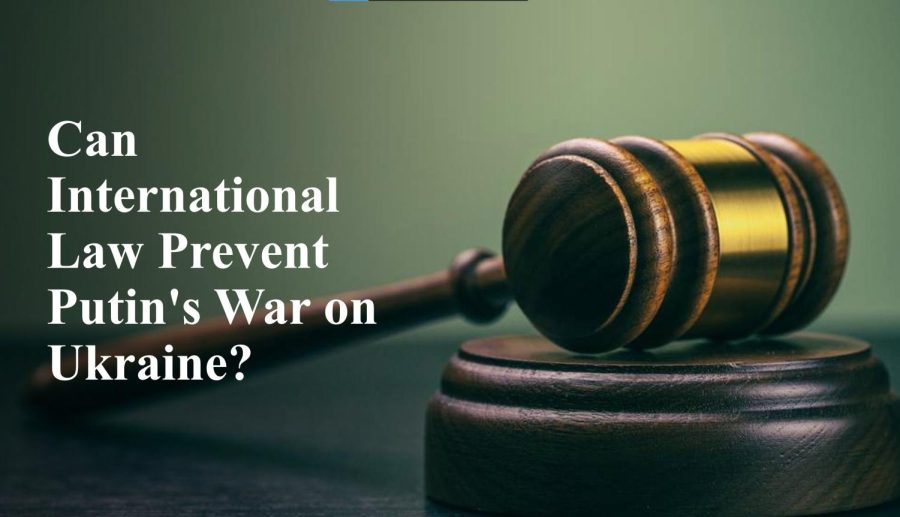Can International Law Prevent Putin’s War on Ukraine?
EDITOR’S NOTE: Stories that I write which pertain to law should NOT be used and considered as legal advice. I am not an attorney, nor can I give you legal advice. I am not licensed to practice law in my jurisdiction. Everything in this article is for informational and educational purposes only. All non-licensed material is used for fair use criticism and educational purposes.
Russia has continued its invasion of Ukraine, and many are calling this “an illegal war of aggression”. But many people are confused as to what standards of war can be defined as illegal, and what even is International Law in itself. Which is understandably confusing and complicated. It’s only been brought to many people’s attention with Russia’s invasion of Ukraine. This has shocked and horrified many people around the world. Almost every nation has condemned the invasion, many calling it “an illegal war”. Even traditionally neutral countries such as Switzerland and Sweden have joined in economic sanctions against Russia. Additionally, the Secretary-General of the United Nations concluded that Russia’s invasion of Ukraine violated International Law, stating that “It is wrong, it is against the United Nations Charter. is unacceptable.” The United Nations Charter, which has been affirmed by 193 members states, says that countries should not invade each other. But what happens next seems to come down to these commonly asked questions, who, if anyone has the authority to enforce International Law, and how can an invading force be stopped?
Law professor Louis Henkin, credited for founding the study of human rights law, famously wrote “Almost all nations observe almost all principles of International Law, and almost all of their obligations, almost all the time.” Henkin’s observation was that in the modern world, most countries agree on the general standards of international conduct. However, troubles arise due to the term, “almost.” Do these international standards have the force of law when nations disagree with them or simply don’t acknowledge them? This article will discuss the standards of International Law, what it is and is not, and what the future may intel for Ukraine.
The Context in Both Nations.
Before proceeding, however, we need to comprehend Russia and Ukraine’s history. Since this is an overly complicated and influential subject, this article will briefly investigate the matter. I believe, however, that this will be extremely helpful in understanding this situation.
From 1922 until 1991, Ukraine was a member of the Soviet Union. But in 1991, it declared its independence and became its sovereign state. In 2004, the Orange Revolution led to annulling a presidential election which was claimed to be marred by massive corruption, voter intimidation, and electoral fraud. New elections were held in 2005 that eventually led to Viktor Yushchenko beating the Russian-backed president. But Yanukovych finally succeeded in the 2010 election. But in 2013, the Ukrainian people launched a protest movement against the corrupt pro-Russian President Viktor Yanukovych, who was seen to be supported by Russian oligarchs who opposed NATO. Coincidentally, during this era, Donald Trump’s campaign manager, Paul Manafort spent 10 years as one of Yanukovych’s advisors. Donald Trump was later impeached in 2020 by the House after he put on hold $391 million in congressionally improved military aid to Ukraine. In 2013, Ukraine’s government at the time was going to sign an agreement establishing closer ties with Europe, but Yanukovych prevented that movement one week before the agreement was to be signed. Instead, he announced that Ukraine would strengthen ties with Russia. This announcement reneged on a campaign promise and Yanukovych’s popularity plummeted. After the Euromaidan protests, Yanukovych fled to Russia, and Ukraine’s elected a pro-Western government. In 2014, Russia attempted to launch a cyberattack on Ukraine Central Election Commission so that it would present a far-right candidate, who in fact, got less than 1% of the vote as the winner. As historian Tim Snyder documented, “the hack failed but Russian media had been prepared for its success and Russian television went on air with falsified documents, even digital images that matched what the hack was supposed to produce.” When the election gambit failed, Russia invaded Ukraine and annexed the territory of Crimea. In 2019, former comedian Volodymyr Zelenskyy, who on TV, played a history teacher who ran on an anti-corruption platform, became the president of Ukraine. Prior to this most recent invasion, Zelenskyy was famous in the United States for having what was called a “perfect phone call” with former president, Donald Trump in 2019. Sometime later in February of 2022, Russian President Vladimir Putin launched a full-scale invasion of Ukraine, claiming that he needed to limit Nazism in Ukraine and that he was defending the people of the Donbas regions of Ukraine. The international community recognized that Donbas, including Crimea, is part of Ukraine. So, the question that’s on everyone’s mind is, is this an illegal war? If so, what does that mean? Unfortunately, it doesn’t mean that much.
What Is International Law?
The phrase “International Law” provides somewhat of a poor description. The reason being is International Law isn’t binding in the way that American laws are. In the United States, the primary sources of law are the Constitution, laws enacted by Congress, rules promulgated by federal agencies, state constitutions, laws enacted by state legislatures, rules promulgated by state agencies, and city or county Charters and local laws. As you may already know, there’s a hierarchy to these laws. Statutes and rules can’t contradict a higher source of law. For example, the US Constitution is primarily at the top. This means that a state law or a state constitution that contradicts the federal constitution where state law is supreme is considered void. But in contrast, there isn’t an international hierarchy of law. Sovereign nations may agree on general principles of conduct but there isn’t a body of International Law that is superior to their own national laws. What needs to be established about International Laws is that everything is dependent on the individual states, and as you can imagine, individual sovereign nations are incredibly reluctant to give up any of their autonomy and to subject themselves to the potential whims of other countries. The United States is no exception to this rule.
The most important sources of International Law are Customary International Law derived from the practice of the states, treaties between the states, and general principles of law, recognized by civilized nations. The oldest source of what we call International Law tends to be Customary International Law. This doesn’t necessarily have a written source like a criminal code. You can compare it to English Common Law since it’s composed of unwritten rules that are derived from custom and practice. A rule of customary law has two elements. First, there must be widespread and consistent state practice. The practice must be by the government but must also be recognized by the state’s courts and parliament. Second, there must be what’s called Opinio Juris, which is the state’s belief that it has a legal obligation. An example of Customary International Law can be Diplomatic Immunity. Diplomatic Immunity is a principle that gives certain foreign government officials the right to safe passage through other countries, guaranteeing the diplomat cannot be sued or arrested for violating the host country’s law. This principle of Diplomatic Immunity is one of the oldest elements of foreign relations observed in ancient Greece and Rome sometimes. Prior to World War II, countries recognized Diplomatic Immunity based simply on precedent. But after World War II, Diplomatic Immunity was embedded in several international conventions. As of today, all nations agree that diplomats have Diplomatic Immunity, although they can be expelled from their host countries for violating the law.
Treaties.
As it’s established, treaties are the second source of International Law. An International Treaty is a written agreement between International Law subjects reflecting their consent to the creation, alteration, or termination of their rights and obligations. Treaties may also be referred to as agreements, conventions, or protocols. Treaties and laws are not the same. A treaty is a source of an obligation under the law and treaties are only binding on states which agree to become parties to them. There is no international tribunal or government that can force any sovereign nation to become a party to a treaty against that nation’s will. If there is no government or court that can compel states to join or a court that can compel states to join or comply with a treaty, why are treaties binding at all?
It is because of a customary principle of International Law called Pacta Sunt Servanda, which is Latin for “agreements must be kept”. All states recognize that they are bound by the agreements that they make and therefore, they are obligated to honor their treaties. But sometimes a treaty will memorialize a principle of Customary Law codifying a general understanding between nations. An example of such is the 1969 Vienna Convention on the Law of Treaties codified the basic Customary Principles governing international treaties. The Vienna Convention is known as the treaty on the treaty. In the United States, for example, a treaty only becomes binding if Congress agrees that it should become binding and effectively, the law of the United States. Once again it is primarily about the consent of the government. If a country wants to you can say “back out” of a treaty, there’s effectively nothing that any other country can do.
General Principles of Civilized Nations.
These can be defined as general principles of fairness and justice which are applied universally in legal systems around the world. Although that sounds sweeping these principles are gap fillers. When there’s a dispute and there is no provision in an international treaty, statute, or any recognized Customary Principle of International Law, the general principles of law can be used to fill the gaps. An example of that would be the admission of indirect evidence. In 1949, an International Court of Justice decision addressed whether Albania had civil liability for the mining of the Corfu Channel and subsequent damage to two British Naval vessels. The court ruled that the UK could establish the knowledge and responsibility of Albania for laying mines in the water through indirect evidence since indirect evidence is admitted in all systems of law. There are, however, other miscellaneous sources of International Law that may help resolve international disputes. You can refer to court decisions, writings by International Lawyers, and actions taken by the United Nations and its many organs. But if the prior sources of International Law aren’t binding, these certainly are not going to have that much of a presidential effect.
What about the United Nations?
The United Nations was established after World War II to provide a formal way for nations of the world to communicate and resolve disputes. The Charter of the United Nations is an international treaty that commits member states to settle their disputes by peaceful means. Many people have the mistaken impression that the UN General Assembly is the government of the entire world. However, the United Nations General Assembly has no power to legislate for the international community. Its resolutions are not legally binding. The General Assembly cannot enact International Laws and then force member states to submit to its authority. UN resolutions do influence international relations but they’re not the equivalent of laws and statutes.
The UN Security Council is the only international body that has the authority to make binding decisions on all nations. The council has 15 members. You may already know that the five permanent members are China, France, Russia, the United Kingdom, and the United States. Additionally, there are 10 non-permanent members whose terms have been running for two years. Each member has one vote. In 2022, the temporary members of the Security Council are the United Arab Emirates, (UAE) Albania, Brazil, Gabon, Ghana, India, Ireland, Kenya, Mexico, and Norway. The five permanent members all have veto power over all UN Security Council matters. Under the Charter of the United Nations, all member states are obligated to comply with Council decisions. Therefore, decisions by the UN Security Council are not considered legally binding. Under Chapter VII “The council can take measures to enforce decisions and ensure that mandates are fulfilled. The Security Council can impose economic sanctions or order an arms embargo, and on rare occasions, the Council has authorized member states to use “all necessary means,” including collective military action to see that its decisions are carried out.” All member states are obligated under the UN Charter to carry out the Security Council’s decision.
Everyone is remarkably united about Russia’s actions against Ukraine, it will still be difficult if not impossible for the Security Council to take direct action against Russia. Most Security Councils’ decisions require a majority of the nine members’ consent of all five permanent member states. Russia, a permanent, member vetoed a Council resolution condemning its attack on Ukraine. China, India, and the United Arab Emirates abstained from that vote. But if Russia continues to remain a member of the UN Security Council, no resolution will pass. Notably, there is an interesting legal movement gaining some traction and might make even more progress within an abbreviated time, which states that Russia is in fact not a member of the UN Security Council. Effectively, the argument’s foundation states that the original member of the UN Security Council was the Soviet Union, and the Soviet Union collapsed. Though it was succeeded by the Russian Federation, Russia assumed that they were a replacement that was originally created for the USSR. Some argue that without formalizing this relationship with Russia, Russia does not hold the seat that the former Soviet Union held on the Security Council. This does seem scarcely credible, but time will tell.
Is The War in Ukraine Illegal under International Law?
Yes, but the principle that war’s illegal is only as strong as the international community’s willingness to intervene in the conflict. The first modern attempt to make war illegal was in 1928 when the United States and France formed the Kellogg-Briand Pact, where dozens of nations joined the treaty which called on countries to settle their disputes peacefully. This treaty was only as effective as its members’ commitment to it. Obviously, this pact meant nothing when World War II erupted a decade later. Nations tried again in 1949 with the Geneva Conventions. The Geneva Conventions govern how civilians, prisoners of war, and soldiers are treated. You may have heard that the Geneva Conventions prohibit nations from torturing individuals or using torture to extract information. Effectively, all nations joined the Geneva Conventions, but these treaties only govern how people are treated during the war, the legality of the war itself however is not mentioned. Even though the Security Council’s actions are said to be binding, they’re only binding if the Council chooses to enforce them. For example, the Iran-Iraq War in the 1980s clearly violated the laws of war, but the Security Council took no steps to intervene. Most importantly, there is the International Criminal Court. As of now, the ICC is an independent judicial institution that was established in 2002. It is empowered to investigate and prosecute war crimes, crimes against humanity, genocide, and the crime of aggression. 123 nations are ICC members, which means that these countries have given the ICC the authority to investigate and prosecute crimes committed by their nations or by anyone on their territory. The ICC doesn’t have authority over nations that aren’t a party to the treaty. The United States, for example, did not join the ICC. Former President Bill Clinton signed the Rome Statute, which authorized the ICC, but the Senate wouldn’t ratify it. President George W. Bush then unsigned the treaty, informing the UN that the United States did not recognize any obligations under the ICC.
Nevertheless, US citizens can still be prosecuted for committing war crimes if it occurs in a territory that is an ICC member. Afghanistan, for example, is a party to the ICC and can request that the ICC investigate Americans for committing war crimes. However, the ICC cannot override the laws of any sovereign nation. It only exercises its authority when a country is either unwilling or genuinely unable to investigate and prosecute war crimes. Countries are free to prosecute war crimes in their own courts, as you may already know. Neither Russia nor Ukraine have signed or adopted the Rome Treaty and are not members of the ICC. This means Russia cannot be prosecuted for the crime of aggression.
We’re already a month into this crisis and many people are concerned that there will be a world war because of it. To clarify what that means, a world war is a war that is engaged by multiple principal nations across the world. Countries such as the United States, China, Russia, India, Japan, etc. In this conflict especially, the United States has been very hesitant in getting involved by imposing a no-fly zone as well as deploying troops to Ukraine. The reason being is that by getting involved with Ukraine would mean getting involved with Russia and any future altercations. That hasn’t stopped Putin from threatening world war. In fact, Putin has threatened NATO allies daily. It’s likely because he is becoming more desperate that he may continue to provoke NATO. Because he is aware that the United States does not have the intentions of getting into the war. Should Putin attack a NATO ally, the United States, along with other NATO members will respond. It is speculated that Ukraine’s government will submit to Russia’s demands. One of these conditions is an acceptance to remain neutral and prohibit Ukraine from applying to join NATO. Additionally, Ukraine would have to undergo a disarmament process to ensure it would not be a “threat to Russia.” More negotiations between the two countries would also involve the regions of Dombas and the status of Crimea. Which was annexed in 2014. However, President Volodymyr Zelenskyy has not publicly addressed these demands. Some state that Putin’s demands are not as harsh as others feared, and they scarcely seem to be worth all the violence, and destruction which Russia has caused. Given that Putin has control over Russian media, he will portray this as a victory for Russia. For Ukraine however, If the details of any agreement aren’t sorted out with immense care and proficiency, Putin could use them to justify Russia’s actions. In the end, this is just a possibility.

My name is Diamond. I just graduated high school and now I'm producing content part-time online. My most popular profile is @BlindOS_22 on TikTok which...














Diamond M. Garcia • Mar 30, 2022 at 10:11 am
Visit our Facebook Page to stay up to date on this developing situation.